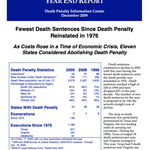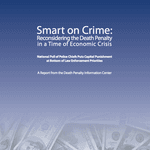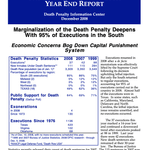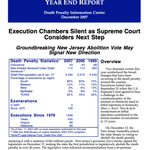DPI Reports
Below are reports released by the Death Penalty Information Center since its inception, covering subjects such as race, innocence, politicization, costs of the death penalty, and more. When opening a report, please allow the report page to load fully before selecting links to sections or footnotes. Most of these reports are also available in printed form from DPIC. For a copy of one of these reports, e‑mail DPI. For bulk orders, please download our Resource Order Form.
Reports are separated into Year End Reports, In-Depth Reports, and Special Reports. In-Depth Reports are DPI’s signature long, thorough reports on major death-penalty issues. These include “The 2% Death Penalty,” examining geographic arbitrariness in capital punishment, and “Behind the Curtain,” covering secrecy in the death penalty system. Special Reports are shorter, and typically address a specific event or question. These include DPI’s explanation of the 2017 spate of executions that were scheduled in Arkansas, and our analysis of the largest number of executions performed on a single day.
Reports: 41 — 45
Dec 17, 2009
The Death Penalty in 2009: Year End Report
(Washington, D.C.) The country is expected to finish 2009 with the fewest death sentences since the U.S. Supreme Court reinstated the death penalty in 1976, according to a report released today by the Death Penalty Information Center. Eleven states considered abolishing the death penalty this year, a significant increase in legislative activity from previous years, as the high costs and lack of measurable benefits associated with this punishment troubled…
Read MoreOct 20, 2009
Smart on Crime: Reconsidering the Death Penalty in Time of Economic Crisis
Smart on Crime is a new report from the Death Penalty Information Center that explores the prospect of saving states hundreds of millions of dollars by ending the death penalty. The report also serves to release a national poll of police chiefs in which they rank the death penalty at the bottom of their priorities for achieving a safer…
Read MoreDec 10, 2008
The Death Penalty in 2008: Year End Report
Executions resumed in 2008 after a de facto moratorium was effectively lifted by the Supreme Court following its decision upholding lethal injection. But only the South returned to regular executions, accounting for 95% of executions carried out in the country in 2008. Almost half of the executions were in Texas. In some states, such as California, Maryland, Delaware and North Carolina, the lethal injection issue remains unsettled, and no executions…
Read MoreDec 17, 2007
The Death Penalty in 2007: Year End Report
Two dramatic events this year symbolized the broad changes that have been occurring in the death penalty around the country. Executions halted after September 25 when the U.S. Supreme Court agreed to hear a challenge to the constitutionality of the mixture of chemicals used in lethal injections in Kentucky (Baze v. Rees). This de facto moratorium on lethal injections contributed to the fewest number of executions…
Read MoreJun 09, 2007
A Crisis of Confidence: Americans’ Doubts About the Death Penalty
According to a national public opinion poll conducted in 2007, the public is losing confidence in the death penalty. People are deeply concerned about the risk of executing the innocent, about the fairness of the process, and about the inability of capital punishment to accomplish its basic purposes. Most Americans believe that innocent people have already been executed, that the death penalty is not a deterrent to crime, and that a moratorium should be placed…
Read More



